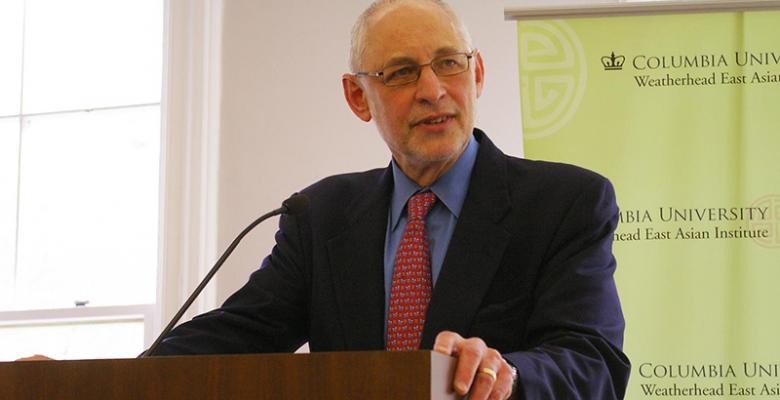5 Questions with Prof. Andrew Nathan on Chinese President's Visit

It won’t be the usual state visit when Xi Jinping, president of the People’s Republic of China, arrives for a visit with President Donald Trump on April 6.
Their meeting will be held not in Washington, D.C. but at Mar-a-Lago, the historic hotel and golf club in Palm Beach, Fla., which is owned by Trump and has become the de facto southern White House. The Chinese are normally sticklers for protocol, notes political scientist Andrew Nathan, and would have wanted the traditional treatment given a head of state—an arrival ceremony on the South Lawn, an Oval Office meeting, a state dinner.
“They would have insisted on that as a matter of face, but I think they’re trying to find a way to work with Trump, who is different from all other American presidents than they are used to because he is so unpredictable,” said Nathan, the Class of 1919 Professor of Political Science, an expert on Chinese politics and foreign policy. “ I think they’re playing this game the Trump way and getting what they understand is the top level of treatment in the Trump universe. In that way they get access, and it shows flexibility on the part of the Chinese leadership.”
Nathan is a longtime chronicler and keen observer of Chinese politics and geopolitics, despite having been banned from the country after the publication of The Tiananmen Papers, a cache of secret official documents about the 1989 demonstrations that he co-edited. He discussed the Chinese state visit with Columbia News.
Q. What can be expected from this meeting?
A. The Chinese and the Americans have very different agendas. Trump, like most American presidents before him, wants the Chinese to help deal with the North Korean threat, although unlike his predecessors he says so in tough-sounding 140-character tweets. The Chinese answer is that they don’t have as much influence as Trump thinks they do. With his suggestion of a military option, Trump has only reaffirmed the existential threat to Pyongyang that drives their nuclear program. The Chinese would say that the way to begin is to start building trust with the North Koreans by making some kind of initial concession. I think that agenda item will lead to disappointment for Trump.
Q. Are other issues likely to be similarly disappointing for the administration?
A. China has gotten in to see Trump ahead of other Asian leaders except for Japan’s Prime Minister Shinzō Abe, and has already helped shape his view through what people are calling the Jared Channel—his son-in-law, Jared Kushner, who has handled much of the preparations for the summit. The Chinese are in an advantageous position here, because Trump is virtually a blank slate on these issues, and they’re in to see him before he has a full senior staff with Asian expertise. Trump is liable to look at these discussions in a narrow bilateral context and think, “we can get along with these guys,” and not see how it affects our allies.
Q. How can the Chinese influence Trump?
A. We’ve already seen some unofficial ways, with China’s trademark office granting preliminary approval last month for 38 Trump trademarks on products such as hotels and golf clubs, an application that the Trump Organization had been pushing for more than 10 years. There is the $400 million that Anbang Insurance was considering investing in a Fifth Avenue building owned by Kushner, an investment that has been derailed but it could come up again in another form. There are many ways to cooperate publicly and privately, and the Chinese are very skillful at that.
Q. What else is the U.S. looking for from these meetings?
A. Xi Jinping is in an easy position to make Trump look good by agreeing to invest in American infrastructure, which would create jobs and also be good for China. The Chinese are also unhappy about restrictions on investment in the United States, which have prevented them from buying more high tech firms and acquiring technology. They have frequently been stalled by the Committee on Foreign Investment in the United States (CFIUS) an inter-agency committee that reviews the national security implications of foreign investments in U.S. companies or operations, and which has the power to veto foreign investment. So a big ask for Xi is to reduce restrictions on investments here. Trump can give this to Xi and call it job creation. The risk is that doing so would risk further leaking of our advanced technology to a major manufacturing rival.
Q. What other issues are likely to be discussed?
A. China has gotten a reaffirmation of the One China policy, but there are people in the administration who want to upgrade the protocol treatment of Taiwan and increase weapons sales there. Xi will want to convince Trump that such moves would be dangerous. And then there is the South China Sea, where a number of Southeast Asian countries claim maritime rights, but China has built man-made islands and started aggressively patrolling the seas. I think it’s likely that Xi will say that the tensions there are the fault of former Secretary of State Hillary Clinton, who adopted a more assertive U.S. posture in the region, and if the Americans would just stop patrolling so actively and colluding with other countries that have competing claims, there would be no crisis. It wouldn’t be popular with the U.S. military or with our Asian allies if Trump accepts that argument.